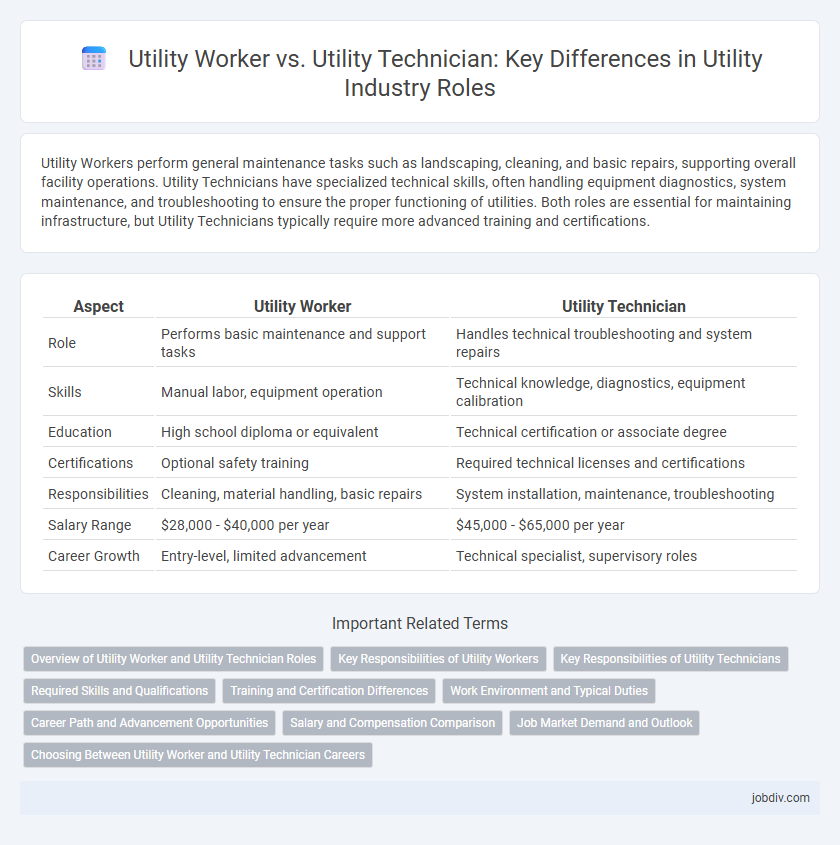Utility Workers perform general maintenance tasks such as landscaping, cleaning, and basic repairs, supporting overall facility operations. Utility Technicians have specialized technical skills, often handling equipment diagnostics, system maintenance, and troubleshooting to ensure the proper functioning of utilities. Both roles are essential for maintaining infrastructure, but Utility Technicians typically require more advanced training and certifications.
Table of Comparison
| Aspect | Utility Worker | Utility Technician |
|---|---|---|
| Role | Performs basic maintenance and support tasks | Handles technical troubleshooting and system repairs |
| Skills | Manual labor, equipment operation | Technical knowledge, diagnostics, equipment calibration |
| Education | High school diploma or equivalent | Technical certification or associate degree |
| Certifications | Optional safety training | Required technical licenses and certifications |
| Responsibilities | Cleaning, material handling, basic repairs | System installation, maintenance, troubleshooting |
| Salary Range | $28,000 - $40,000 per year | $45,000 - $65,000 per year |
| Career Growth | Entry-level, limited advancement | Technical specialist, supervisory roles |
Overview of Utility Worker and Utility Technician Roles
Utility Workers perform a wide range of manual tasks including maintenance, repair, and installation of utility infrastructure such as water, gas, and electrical systems. Utility Technicians specialize in diagnostic testing, technical troubleshooting, and the use of advanced equipment to ensure optimal operation and safety of utility systems. Both roles are essential in maintaining continuous utility services, though Utility Technicians require more technical training and certifications compared to Utility Workers.
Key Responsibilities of Utility Workers
Utility Workers primarily handle the maintenance and repair of essential infrastructure such as water, gas, and electricity systems, performing tasks like installing, inspecting, and troubleshooting equipment. They engage in manual labor including digging trenches, laying pipes, and removing obstructions to ensure uninterrupted utility services. Their key responsibilities also involve monitoring system performance, reporting issues, and assisting Utility Technicians with more complex technical operations.
Key Responsibilities of Utility Technicians
Utility Technicians are responsible for installing, maintaining, and repairing complex utility systems such as electrical grids, water pipelines, and gas distribution networks. They perform diagnostic tests, troubleshoot technical issues, and ensure compliance with safety regulations to prevent service interruptions. Their expertise includes operating specialized tools and interpreting blueprints to support infrastructure reliability and efficiency.
Required Skills and Qualifications
Utility Workers typically require basic technical skills such as manual labor proficiency, knowledge of safety protocols, and the ability to operate simple tools and machinery. Utility Technicians demand advanced qualifications including specialized certifications, technical training in electrical or mechanical systems, and expertise in diagnostic equipment and repair techniques. Both roles necessitate strong problem-solving abilities, physical stamina, and adherence to regulatory standards, but technicians generally handle more complex troubleshooting and system maintenance tasks.
Training and Certification Differences
Utility workers typically receive on-the-job training focused on basic maintenance and operational tasks, requiring minimal formal certification. Utility technicians undergo specialized training programs often involving technical schools or apprenticeships, leading to certifications such as NATE or OSHA compliance credentials. The certification process for technicians ensures proficiency in advanced skills like system diagnostics, repair, and regulatory compliance, distinguishing them from general utility workers.
Work Environment and Typical Duties
Utility Workers often operate in diverse outdoor environments, including construction sites and maintenance zones, performing manual labor such as digging, equipment setup, and basic repairs. Utility Technicians typically work in both field and controlled indoor settings, handling more specialized tasks like system troubleshooting, equipment calibration, and technical diagnostics. The distinction lies in the level of technical expertise, with Technicians focusing on advanced electronic or mechanical systems, while Workers support foundational infrastructure maintenance.
Career Path and Advancement Opportunities
Utility Workers typically begin with entry-level tasks such as equipment maintenance and site support, offering foundational experience in the utility industry. Utility Technicians often possess specialized technical training and certifications, positioning them for roles involving system diagnostics, repairs, and complex equipment operation. Career advancement opportunities for Utility Technicians generally surpass those of Utility Workers, with potential pathways into supervisory roles, technical specialist positions, or project management within utility companies.
Salary and Compensation Comparison
Utility workers generally earn an average salary ranging from $30,000 to $45,000 annually, while utility technicians typically command higher compensation, with salaries between $40,000 and $65,000 per year due to specialized technical skills. Benefits for utility technicians often include overtime pay, certification bonuses, and comprehensive health coverage, contributing to a more competitive overall compensation package compared to utility workers. Salary variations depend on factors such as geographic location, industry demand, and level of technical training or certifications held.
Job Market Demand and Outlook
Utility Technicians experience higher job market demand due to their specialized skills in equipment maintenance and technical troubleshooting within power and water utilities. Utility Workers hold strong employment opportunities driven by ongoing infrastructure projects and general labor needs in utility services. The outlook for both roles remains positive, with Utility Technicians projected to grow faster as utility companies adopt advanced technologies requiring skilled technical support.
Choosing Between Utility Worker and Utility Technician Careers
Choosing between a utility worker and a utility technician career depends on the level of technical skill and training required; utility workers often perform essential manual tasks such as maintenance and cleaning, while utility technicians handle complex equipment diagnostics and repairs. Utility technicians typically require specialized certifications or vocational training, leading to higher earning potential and advanced career growth opportunities. Considering interests in hands-on work versus technical problem-solving is critical for making an informed career choice in the utility sector.
Utility Worker vs Utility Technician Infographic

 jobdiv.com
jobdiv.com